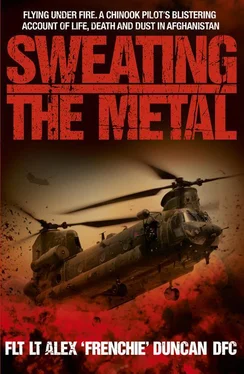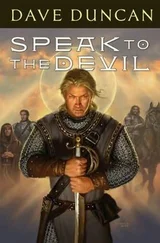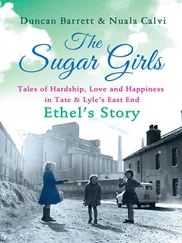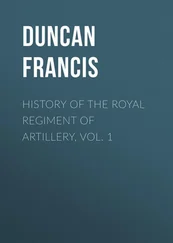Fuck me; are life and death really so finely balanced on a knife’s edge?
As we’re standing by the cab, a Mastiff AFV drives up and some Scots Guards soldiers get out to look at the cab. One of the sergeants comes over to Alex and me.
‘Fuck me, sirs. I was listening to the ICOM – I can’t believe you guys carried on!’ he says. I wonder then just what the ICOM was saying. ‘I can’t believe how lucky you are!’ He looks at the airframe and laughs. There seems to be a lot of nervous laughter around today.
I mull over the irony of our call sign, Black Cat Two Two. To take an RPG and have it punch a hole through your rotor – that’s got to be all nine lives lost in one go.
A Squadron Leader approaches us and shakes my hand. ‘Bloody hell, guys. Well done!’ he says. ‘That was almost a strategic victory for the Taliban – that’s how close it was.’ And I guess it would have been. When you bear in mind that as well as Gulab Mangal, we had his whole team in the back and the FCO Provincial Reconstruction Team, and then there was the aircraft itself – it wouldn’t just have represented a major tactical and PR victory for the Taliban, but it would arguably have meant a strategic disaster for ISAF that could have changed the course of events in Helmand Province. That’s how serious it was.
Widow Seven Five comes over and introduces himself and he’s hospitality itself. He wakes up the chef, gets him to knock something up for us. We’re humbled and touched beyond belief because these guys have nothing and they’re sharing what little they’ve got with us.
We spent over six hours at FOB Edinburgh in the end, while waiting for a lift back to Camp Bastion, and it was a real eye-opener. It’s the first time I’d ever seen life in a FOB first-hand and, if I’m honest, it shocked me just how spartan it was. They didn’t even have any running water there. A couple of hours after we touched down, my digestive system woke up and had an argument with my guts, which is when I got to use the Vietnam-style toilet – a plank of wood with a hole in, laid over a ten-gallon oil drum. Gulab Mangal came over to say thanks a short time later and he shook my hand – fortunately I’d washed them at that point!

Being at Edinburgh all that time made me realise just how different the war can be for those of us out there; this was illustrated in vivid, colourful fashion. Although FOBs are our bread and butter – and we’re flying in to as many as ten, maybe more, each day – all we ever really see is the HLS. We get a brief overview of the camp as we come in, we’re on the ground for a minute or so, and then we’re off again. Here, we actually got a taste of how the guys lived because we were up close and personal.
We saw their accommodation, got a good look at their faces – drawn, tired, unshaven, unkempt. No running water, no electricity, primitive toilets. They lived in shelters built out of two blocks of Hesco with a sheet of black fabric over the top to create an air gap (and hopefully provide some rudimentary cooling) and they slept on cots with mozzie nets over them. That was quite literally it – this is how they live for their six-month tours. Spartan doesn’t even come close. We were left with an even deeper respect for the guys that we serve.
What we experienced at the FOB made us feel embarrassed by the relative opulence of KAF – its shops and restaurants on the boardwalk, the air-conditioned, brick-built accommodation and flushing toilets, proper showers, wi-fi – the whole nine yards. The contrast is immense between the guys on the ground and the guys driving desks, and somehow it all seems upside down and back to front.
For us, it meant that every opportunity we got subsequently, we’d make a personal effort to get stuff to the FOBs, anything to make the guys’ lives easier. We’d buy crates of Coke – as many as we could afford – and kick them out to the guys whenever we could.
I think all of us found it pretty hard in the aftermath, while we sat around waiting to be lifted, because suddenly we had nothing to do and all the adrenaline was wearing off. Once the initial elation of having survived waned, we were all left alone with our thoughts, each of us reliving what had happened, what might have been.
One of the PRT’s close protection officers sought us out later and told us he’d seen the firing point – it was about 300m away in our 10 o’clock as we flew along the wadi – and he saw how many guys there were. He said he saw the RPG being fired at us, and even noticed the puff of dust from the back-blast. He’d seen other guys around the trigger man armed with heavy machine-guns and AK-47s; they’d been hiding behind a compound, which was why neither Alex nor I had seen them on our run in. It was complete luck – the bodyguard happened to look out of the window at precisely the time we were engaged. On such matters of chance, life is built.
Eventually we got back to Bastion and JP met us off the cab with Woodsy, who’d been my flight commander on my first Det in 2006. Typical JP – he’s straight down the line and brutally honest.
‘Are you going to be alright fellas? Do you want to stand down or crack on?’
‘Don’t worry Frenchie,’ added Woodsy, ‘lightning never strikes twice.’
I glanced at the other guys and they all nodded. I looked JP in the eye and said, ‘I think it’s best to get straight back into that saddle and not think about it.’
I’ve mulled over what happened extensively; all of us have. You try and look for explanations; but even now, I still can’t believe we survived after that RPG hit us. You don’t even want to think about the fallout if we’d gone down: the PR cost to the Government or the tactical impact on the guys in theatre. We only had eight Chinooks in Afghanistan then and they were being flown relentlessly – losing one would have been an absolute nightmare.
The only way I can rationalise it is that it was down to my training: had I not flown the way I did, had I not been trained the way I was, we’d have been killed – full stop. I made the firer’s job so much harder by flying fast and low. Had I been higher, he could have put two RPGs in the aircraft. It was partially to do with luck – but it was mostly about professionalism and training.
True to his word, JP had us flying again the following morning; although he kept it simple, so there was nothing too taxing about the day’s taskings. Perhaps more importantly, one of them allowed me to do something I’d been planning since the previous evening: thank Widow Seven Five at Edinburgh for everything he’d done for us.
I guess things were a little awkward for Alex, Coops, Bob and I at first. The day started just like every other day in theatre, except the last time we’d gone through the machinations before taking off, we’d ended the day having been shot down. I guess things were just a little bit harder than we expected and the entire crew was very, very nervous, so we just took everything very slowly. We had a resupply to do first thing into a grid just west of Gereshk, followed by a tasking into FOB Edinburgh.
We went in at high level this time so we could see exactly where we’d been hit. It was all a bit difficult to get our heads around, I guess. I wasn’t sure how I’d feel landing at Edinburgh, but I soon found out. Landing next to ZD575 – our cab – now that was weird. There’s nothing like a bit of psychological hangover to start your day.
Читать дальше













